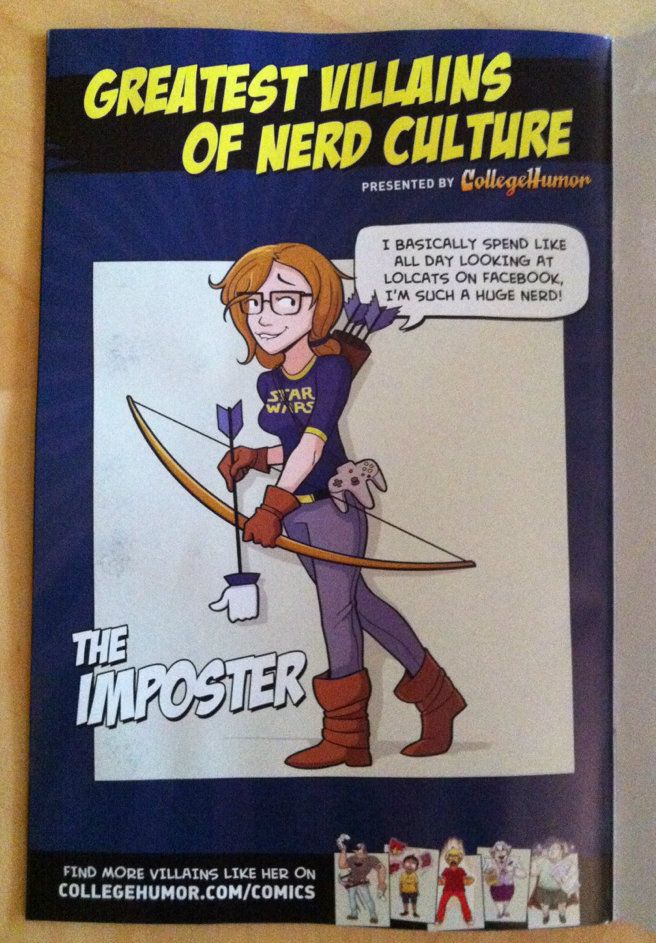While looking over this weeks comics purchases I noticed a perplexing advertisement on the back of my issue of batman. It depicts one of "The greatest villains of nerd culture" called "The imposter". You see, she is one of those ladies who have jumped on the geek bandwagon, but isn't really a nerd at all. She is a POSER, not a real geek like you are me. You can tell this because she likes lolcats (because there aren't any geeks who like cats or the Internet) and because she is a girl, I guess.
Frankly this joke is profoundly sexist and stupid. We live in 2012 where the visible examples of geeky women in our culture are legion; we can stop doubting they exist and interrogating them as to the veracity of their geekyness. Also: as a culture that years and years ago was a collection of awkward dudes, aren't we glad that there are women out there with common interests who we might be able to meet at geek events? Also also: geek media companies, don't you want to sell things to the 50% OF HUMANITY that is female? I seriously don't grok this kind of sexist resistance to lady geeks.
But I have issues with the add beyond the rampant sexism (which others are far more qualified to write about). Specifically, I have issue with the idea that being a geek is/should be exclusive.
I get that we all want to be special: to be unique and different from all those non-squares with their sports and dancing. And I get that self identity is important, even if it is just being a geek, and, depending on when you decided/discovered you were a geek, that it might not have been cool and came with a stigma. (Hell, I get it, I went to a high school that was a rampant football jockocracy .... which is weird since I'm Canadian.) But here's the thing, being a geek is COOL now and, along with increased social cache and annoying sitcoms, people WANT to be geeks now which means that there are going to be more geeks. And since being a geek is really just weird enthusiasm for the consumption of certain kinds of media and products and not dependent on any sort of geek formal hierarchy it's not as if you can stop them.
And why would you? What possible effects on your enjoyment do self identified geeks who haven't attended the four year diploma program at the institute of geek technology have? How does being inclusive hurt you?
I'd argue it doesn't. Geek media needs an audience to make money and needs to make money to be made in the first place. The bigger the potential audience for this kind of media (self identified geeks) the more of this media can and will be made. All of these new geeks are buying the things we love which is supporting our favourite creators, media properties, and the corporations who make our geeky consumables which just ensures MORE of what we love. And even if some of these geeks are just pretending to be geeks they are still paying for geek media which STILL supports the production of our favourite media. Even "The Imposter" helps geek culture.
I guess a potential worry is that an influx of new geeks might change geek culture. Maybe a bunch of wishy-washy not-geeks might create a powerful block of consumers and geek media might change to better accommodate them. Maybe corporations will water down our geek interests to appeal to even MORE people and make something unrecognizable to what we love. To this I would suggest that corporations have ALWAYS been trying to make media that appeals to a wider audience (re The Avengers) and that while new and different media might be made to appeal to new geeks, we aren't going to suddenly lose what we have been enjoying. Rather, its just going to be MORE media that is made which just adds to the menu of options for all of us to enjoy. More geek consumers equates to more media and more options, not the loss of existing options.
And if you don't like some of this media, fine, just don't read/watch/buy it. Seriously.
So, can we forget all of this boys club exclusivity nonsense already and just go about enjoying what we like and encouraging other people to do the same?

No comments:
Post a Comment